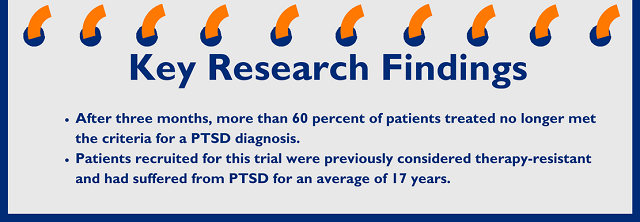For the majority of the population, MDMA, or ecstasy, is simply an illegal drug, its use exclusive to underground dance clubs and its abuse the purview of the police. However, a small group of psychopharmacological researchers and advocates have been touting this compound as the next major frontline treatment for a variety of troubling psychological conditions, such as post-traumatic stress disorder (PTSD) and social anxiety. After more than 10 years of secretive work with exciting results, the United States Food and Drug Association (FDA) recently issued a public validation of these investigators’ work, in which the agency designated MDMA-assisted psychotherapy for PTSD as a “breakthrough therapy,” warranting special consideration as they move through Phase 3 clinical trials.
This determination by the FDA may seem surprising. Why encourage research into an illegal party drug when the psychotherapeutic pharmacopeia is already so extensive? The answer lies not with MDMA but with PTSD, the disease this potential new therapy seeks to treat.
A growing need for new PTSD therapies
PTSD affects nearly 9 percent of all Americans, and the number continues to rise dramatically among veterans and victims of violence. For sufferers of PTSD, the symptoms can make them feel as if they cannot progress past their trauma; they experience flashbacks and recurrent nightmares, and constant anxiety and tension often interfere with their normal lives. Currently accepted treatment primarily includes medications, such as selective serotonin reuptake inhibitors (SSRIs) to combat feelings of anxiety, combined with concurrent therapy to help reframe the traumatic event with the help of a psychologist. However, these treatments require long periods of time and, for many, are never effective. Caring for veterans with PTSD costs the Veterans Health Administration over $17 billion each year. Despite this expense, PTSD-associated suicide remains the 10th leading cause of death in the United States. Against this backdrop, the FDA has become far more willing to look for treatments outside of the usual medical approaches.

MDMA-assisted psychotherapy is an approach to PTSD treatment first developed by psychologist Dr. Michael Mithoefer, and funded by the Multidisciplinary Association for Psychedelic Studies (MAPS). The logic is straightforward and addresses many of the current conundrums facing psychotherapists in treating people with PTSD. Therapists use the “empathogenic” effects of MDMA to reduce fears and increase self-acceptance in their patients, simultaneously strengthening the all-important “therapeutic alliance” between doctor and patient. In doing so, Dr. Mithoefer argues therapists are able to more readily help people address their traumas and completely alleviate symptoms of PTSD in as few as three visits, instead of years of regular therapy.
Although such claims may at first appear bold, Dr. Mithoefer’s preliminary results and Phase 2 clinical trial outcomes entirely support this assertion. Funded by the nonprofit MAPS, Mithoefer treated 107 PTSD patients with MDMA for three therapeutic sessions apiece, and in two months, over 60 percent were independently rated as no longer meeting criteria for a PTSD diagnosis. Most surprisingly, the patients recruited for this successful trial were previously considered therapy-resistant and had suffered from PTSD for an average of 17 years.
Expediting development and testing
The FDA began their breakthrough therapy program in 2012 to facilitate moving promising drugs through the challenging approval process more quickly. This designation requires that “preliminary clinical evidence indicates that the drug may demonstrate substantial improvement over existing therapies,” but for those who can demonstrate such improvements, the FDA will work with the researchers to expedite drug development and testing. Of course, even with this agency support, for MDMA there are still many hurdles for researchers and advocates to overcome. For one, the drug is still considered Schedule I by the Drug Enforcement Agency, and there would need to be an unprecedented open exchange of ideas between researchers and federal agencies for that designation to change. However, in this case, the population most at risk is one held in universally high regard, U.S. veterans, and the possibility of this drug soothing the military’s PTSD epidemic has lit a fire under researchers and government agencies alike. Recently, the Army’s previous highest-ranking psychiatrist, retired Brigadier General Loree Sutton, has come out in support of MDMA-assisted psychotherapy for PTSD, stating: “If this is something that could really save lives, we need to run and not walk toward it. We need to follow the data.” Although we are still several years away from seeing final results from Phase 3 clinical trials, the preliminary data are impressively positive and the stage has been set for data to finally win out over stigma.
Related Content
- Forgetting Fear: Findings could help in "unlearning" to be afraid.
- Ecstasy Use May Lead To Sleep Apnea: Illegal "club drug" poisons neurons involved in control of breathing during sleep